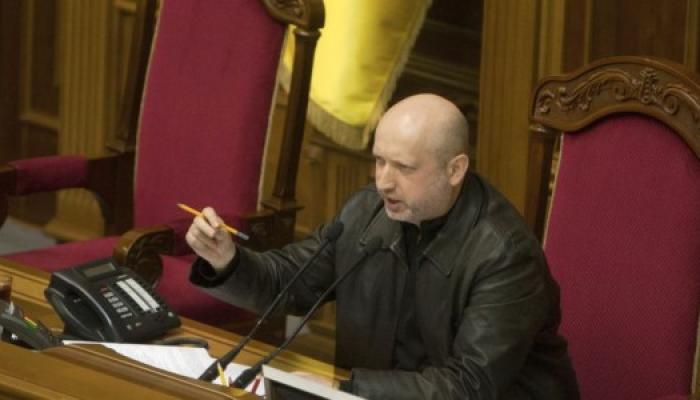Kiev, April 7, (RHC-RIA Novosti) – Ukraine’s interim president vowed to introduce tough “anti-separatism measures” Monday in response to rallies over the weekend for greater autonomy in the country’s mainly Russian-speaking eastern and southern regions.
Acting President Olexander Turchinov said Ukraine’s parliament, the Verkhovna Rada, will consider legislation on Tuesday that would make criminal liability for separatism harsher, and will also examine banning the activities of a range of political parties and social organizations.
“Tomorrow, one of the first things the Ukrainian Verkhovna Rada will do is consider stiffening criminal liability for separatism and other crimes against the state,” Turchinov said.
He added that banning the activities of a number of political parties and social organizations that “promote separatism” would also be discussed.
The acting president said that anti-terrorist measures would be used against those who took up arms in the east, a region where residents fear that the recent surge of Ukrainian nationalism could unfairly marginalize the substantial ethnic Russian community.
Russia has repeatedly said that Ukrainian nationalists and their aggressive rhetoric bear full responsibility for the crisis in the country, which resulted in the reunification of Crimea with Russia last month.
Moscow said that a federal form of government is the only way out of the protracted political crisis in Ukraine, currently a unitary state which is de-facto split into a Ukrainian-speaking west and a Russian-speaking east and south.
The new government, which seized power as a result of a coup in late February, has so far refused to consider the possibility of a federal Ukraine.
Weekend rallies have been held regularly in eastern Ukraine since the new government came into power amid protests against President Viktor Yanukovych and his decision to abandon European integration in favor of stronger ties with Moscow.
On Sunday, rallies in support of greater autonomy for regions with substantial ethnic Russian communities were held in the eastern cities of Donetsk, Kharkov and Lugansk. Protesters demanded a popular vote to decide on the status of their regions and managed to take regional administration buildings under their control.
Articles en relation
Commentaires
Laissez un commentaire
Tous les champs sont requis
En reproduction maintenant
Desde Mi Habana
Au suivant
- La Trova Cubana
- Un lugar para la poesía
- Reflejos
Plus de visites
- Les États-Unis annoncent des restrictions en matière de visas liées à la coopération médicale internationale de Cuba
- Le chanteur populaire Paulo F.G. meurt dans un accident de voiture à La Havane
- Cuba : les migrants à Guantanamo sont une provocation et un affront à la souveraineté (+Photos)
- Le gouvernement cubain condamne les intentions des États-Unis concernant la base navale de Guantanamo
- La fermeture de l'USAID ne signifie pas la fin des agressions contre Cuba


